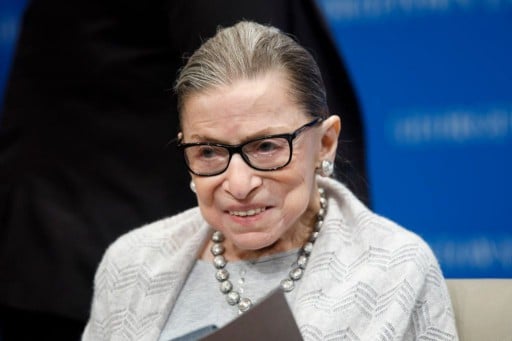Ruth Bader Ginsburg’s Milestones

Tom Brenner / Stringer / Getty Images
Supreme Court Justice Ruth Bader Ginsburg, also known as the “Notorious RBG,” will forever be known as a champion of women's rights and gender equality. Her death in September 2020 concluded a storied career which, among other accomplishments, helped advance and promote financial equality.
While gender disparities have not been erased completely, Ginsburg's work has made a definitive impact on the lives of women. The link between RBG and women's equality is a legacy of her decades of activism, as well as her rulings in several landmark Supreme Court cases. Here's a closer look at some of the key moments of her career.
Who Was Ruth Bader Ginsburg?
Ginsburg's career in law began in 1959, when she served as law clerk for the Hon. Edmund L. Palmieri, a judge of the U.S. District Court for the Southern District of New York. From 1961 to 1963, she worked as a research associate and associate director of the Columbia Law School Project on International Procedure, before becoming a professor of law at Rutgers University School of Law.
From the outset of her career, Ginsburg encountered discrimination and sexism, first from her male classmates at Harvard and Columbia universities, then later as she attempted to secure employment as an attorney.
Note
Her own experiences with discrimination helped to lay the groundwork for the activism that would characterize her career, beginning with the co-founding of the Women's Rights Project of the American Civil Liberties Union (ACLU) in 1972.
Throughout the 1970s and 1980s, RBG continued practicing law and advocating for women's rights and equality. Ginsburg led the ACLU team in a number of important legal cases, including some that were heard by the Supreme Court, before joining that court as an associate justice in 1993. Despite undergoing repeated treatment for cancer, Ginsburg remained in her role as a justice until her passing at age 87.
RBG and Equal Rights
During her tenure as an attorney and later, a judge, Ginsburg was a dedicated advocate for women's equality. In 1973, Ginsburg argued for equal treatment of men and women with regard to distribution of spousal military benefits in Frontiero v. Richardson. In 1979, she won a challenge to a state law that made jury duty optional for women in Duren v. Missouri. Specifically, Ginsburg argued that the law should be struck down, as it treated women's service on jury duty as being less valuable than men's.
Ginsburg's commitment to furthering equality extended beyond women's rights, as she also advocated for equal treatment for members of the LGBTQ community. In 2015, she was part of the majority ruling in the Obergefell v. Hodges case, which decreed that the 14th Amendment guarantees the right to marry to same-sex couples. As recently as June 2020, Ginsburg was still advocating for LGBTQ rights in Bostock v. Clayton County, which found that anti-LGBTQ treatment in the workplace was a form of sex discrimination.
Reed v. Reed and Estate Equality
The 1971 Reed v. Reed case resulted in a landmark High Court ruling and represents one of many defining moments in Ginsburg's career. At issue was a conflict between a separated Idaho couple concerning which of them would serve as administrator of their deceased son's estate.
Sally Reed and her husband, Cecil, had both filed a petition in state probate court asking to be named as administrator. At that time, Idaho code gave preference to men over women when appointing estate administrators. Cecil Reed was named as administrator, and Sally Reed brought a suit arguing discrimination in violation of the 14th Amendment.
Ginsburg, in her capacity as an ACLU volunteer, wrote the brief for Sally Reed that was eventually presented to the Supreme Court. After reviewing the facts of the case, the Court ruled in favor of Sally Reed, determining that the Idaho Code's favoring of men over women was unconstitutional and in violation of the Equal Protection Clause of the 14th Amendment.
Equal Credit Opportunity Act
In terms of furthering financial equality, Ginsburg played a prominent role over the years. Her early work as an attorney with the ACLU paved the way for the passage of the Equal Credit Opportunity Act, which allowed women to obtain credit in their names without needing a male co-signer.
Specifically, this act "prohibits credit discrimination on the basis of race, color, religion, national origin, sex, marital status, age, or because you get public assistance."
Note
The Equal Credit Opportunity Act’s passage removed barriers to women that had previously prevented them from getting credit cards, mortgages, or other loans in their own names.
Pay Discrimination and the Ledbetter Case
In 2007, Ginsburg dissented with the minority in the Ledbetter v. Goodyear Tire & Rubber Co. case, which focused on gender and pay discrimination. The case, brought by longtime Goodyear employee Lilly Ledbetter, claimed pay discrimination under Title VII of the Civil Rights Act of 1964 and the Equal Pay Act of 1963.
The Supreme Court did not rule on the issue of pay discrimination itself; instead, it ruled that the statue of limitations for bringing such claims had passed. Ginsburg argued that a time limit for bringing the claim should not be applied, as pay discrimination is more difficult to detect than other types of adverse actions. The passage of the Lilly Ledbetter Fair Pay Act in 2009, which eased restrictions for challenging discriminatory pay, reflected the arguments Ginsburg outlined in her dissent.
RBG’s Continuing Legacy
In her capacity as an attorney, and later as a Supreme Court justice, Ruth Bader Ginsburg left a lasting mark on the fight for economic equality. That campaign continues through those she's inspired to take a stand for rights for women and the LGBTQ community, among other marginalized groups. While work remains to be done—the gender pay gap, for example, still leaves women earning roughly 82 cents for every dollar a man does—Ginsburg’s legacy endures through greater access to financial freedom.

